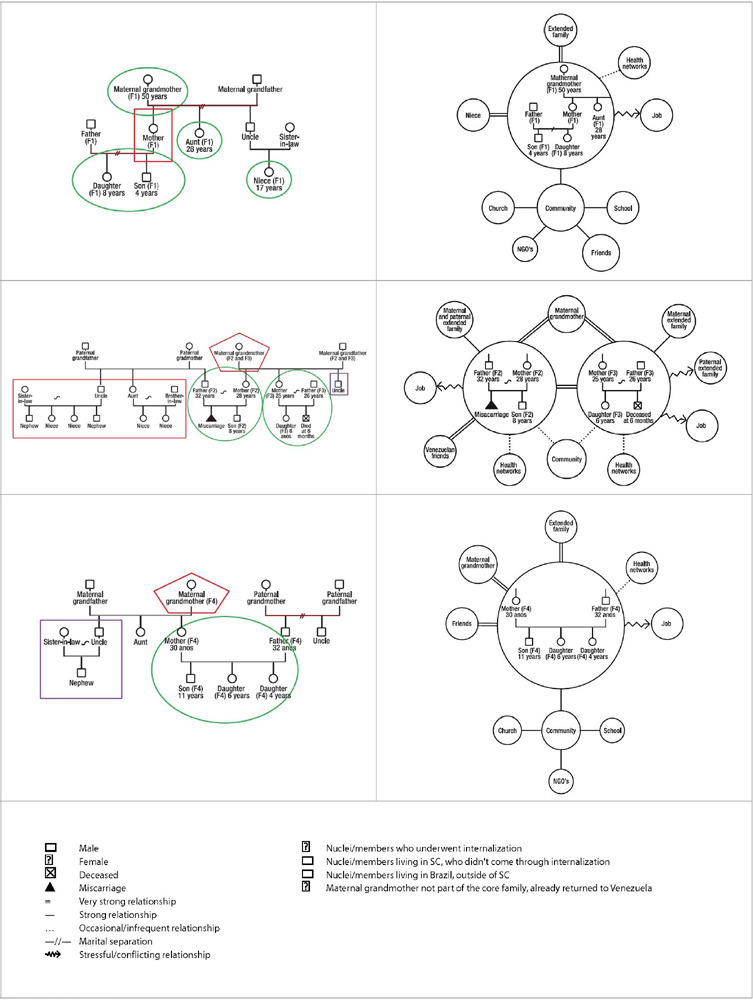-
ORIGINAL ARTICLE12-16-2023
Tangency and multiple factors of violence against lecturer: nuances of the experience in pedagogical practices in health education
Revista Brasileira de Enfermagem. 2023;76(1):e20210865
Abstract
ORIGINAL ARTICLETangency and multiple factors of violence against lecturer: nuances of the experience in pedagogical practices in health education
Revista Brasileira de Enfermagem. 2023;76(1):e20210865
DOI 10.1590/0034-7167-2021-0865
Views0See moreABSTRACT
Objective:
to identify factors that lead the teacher to experience violence in their pedagogical practice in health education.
Method:
research with a qualitative approach, based on the Grounded Theory, conducted with 11 professors of the nursing course of a public university in the central region of Brazil in 2020 and 2021. Online semi-structured interviews were analyzed partially in the light of the Constructivist Grounded Theory.
Results:
factors that lead lecturer to experience violence are characterized by institutional culture, gender, professor’s perception of violence, and the triggers that drive students to commit violence. Social status and inequalities lead to positions of domination and, consequently, create a fertile ground for violence.
Final Considerations:
analyzing violence under Bourdieu’s theory, it is clear that student violence towards lecturer and the reports contained in this study deserve pedagogical reflection. However, it is necessary to include these discussions as a background in teaching environments.
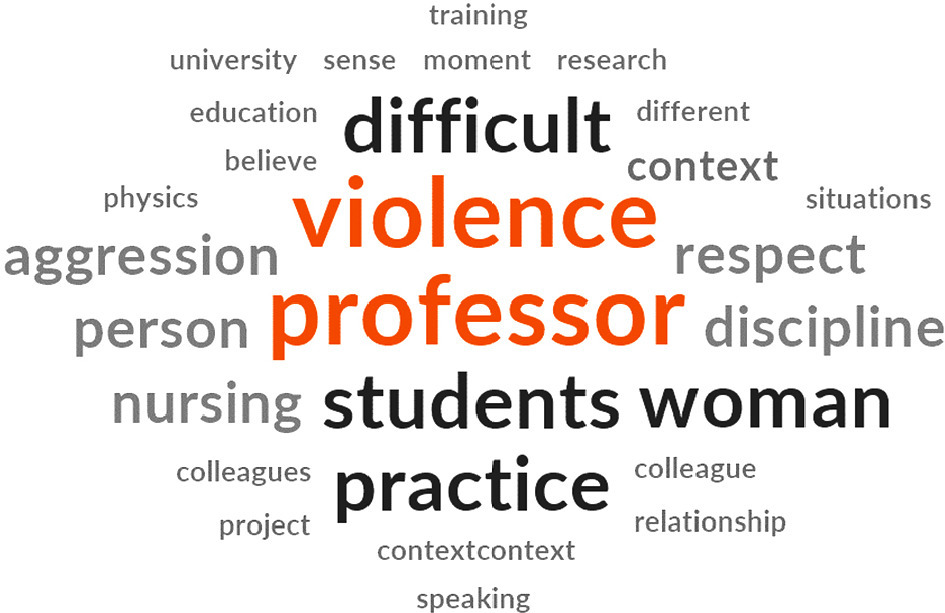
-
REVIEW12-16-2023
Multilevel model in the identification of behavioral and structural risk factors for HIV: integrative review
Revista Brasileira de Enfermagem. 2023;76(1):e20210853
Abstract
REVIEWMultilevel model in the identification of behavioral and structural risk factors for HIV: integrative review
Revista Brasileira de Enfermagem. 2023;76(1):e20210853
DOI 10.1590/0034-7167-2021-0853
Views0See moreABSTRACT
Objectives:
to investigate studies that adopted the multilevel analysis model to identify behavioral and structural risk factors associated with HIV infection.
Methods:
an integrative review of the literature with studies available in full, obtained from EMBASE, CINAHL, Pubmed, and Scopus, whose selected descriptors were the indexed terms: “HIV”, “multilevel analysis” and “behavior”.
Results:
the search resulted in 236 studies. Out of these, ten studies comprised the sample. Economic disadvantage, neighborhood characteristics, housing instability, incarceration, transactional sex, multiple partners, substance abuse, and age at first intercourse were classified as structural and behavioral risk factors for HIV. Reduced socioeconomic disadvantage, provision of housing stability, and condom use were associated with protective factors for HIV exposure.
Conclusions:
by applying the multilevel model in risk factor research studies, it was possible to identify the structural and behavioral elements of HIV risk.
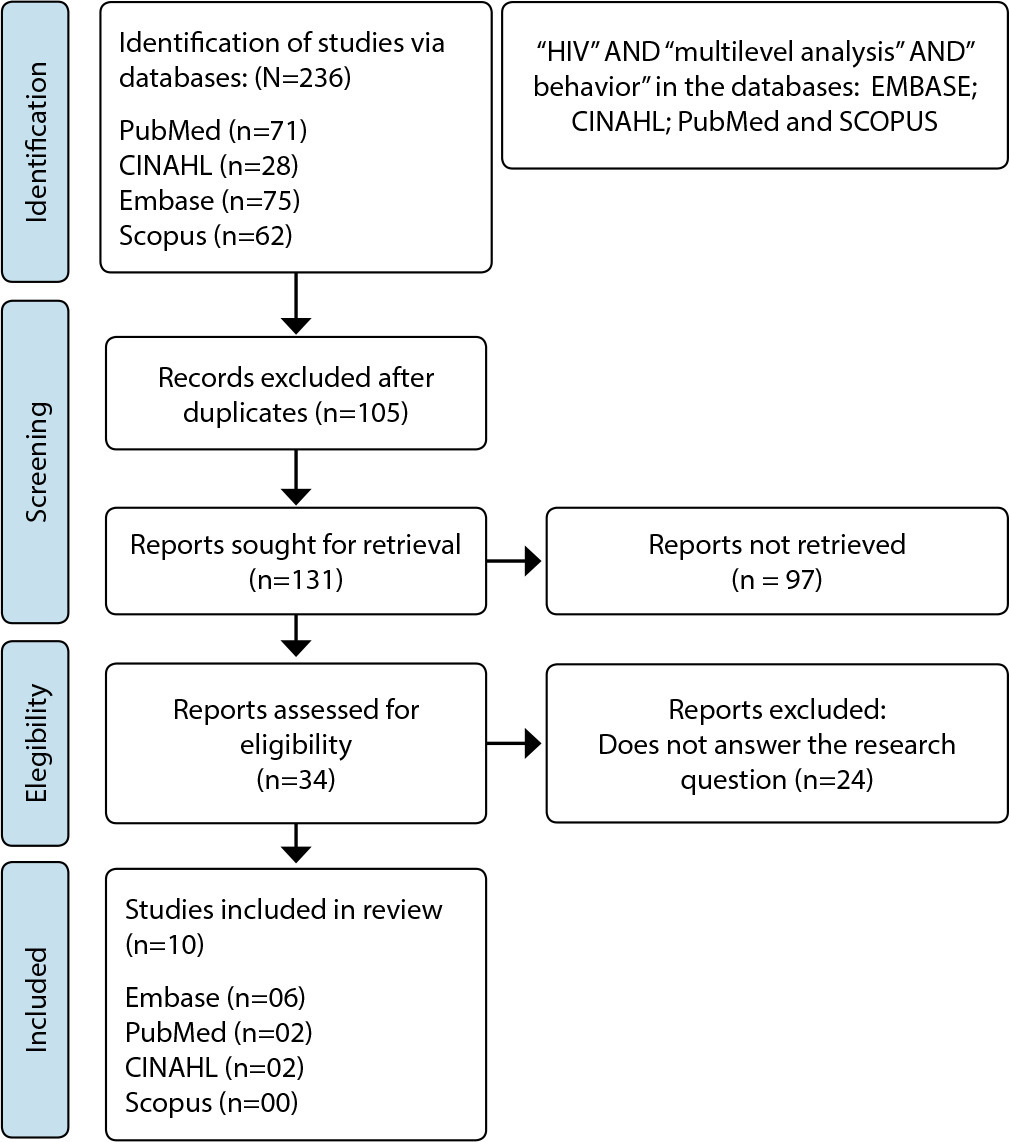
-
ORIGINAL ARTICLE12-16-2023
Analysis of the convergence of the Safety Attitudes Questionnaire and the Hospital Survey on Patient Safety Culture
Revista Brasileira de Enfermagem. 2023;76(1):e20210379
Abstract
ORIGINAL ARTICLEAnalysis of the convergence of the Safety Attitudes Questionnaire and the Hospital Survey on Patient Safety Culture
Revista Brasileira de Enfermagem. 2023;76(1):e20210379
DOI 10.1590/0034-7167-2021-0379
Views0See moreABSTRACT
Objectives:
to analyze patient safety culture from nursing professionals’ perception at a university hospital, by assessing the convergence between the Safety Attitudes Questionnaire and the Hospital Survey on Patient Safety Culture.
Methods:
a cross-sectional study, with 434 nursing professionals. Data collection took place through the application of both instruments. Descriptive and inferential statistics were used.
Results:
in the Hospital Survey on Patient Safety Culture, the “teamwork within the units” dimension was considered a strong area of patient safety. In the Safety Attitudes Questionnaire, the “job satisfaction” and “perception of stress” domains reached the score for a good safety culture. Patient safety culture perception is correlated, in both instruments, with high magnitude.
Conclusions:
the two instruments converge towards a similar assessment of patient safety culture.
-
ORIGINAL ARTICLE12-16-2023
Psychosocial factors related to the behavioral intention of people with type 2 diabetes using insulin
Revista Brasileira de Enfermagem. 2023;76(1):e20210617
Abstract
ORIGINAL ARTICLEPsychosocial factors related to the behavioral intention of people with type 2 diabetes using insulin
Revista Brasileira de Enfermagem. 2023;76(1):e20210617
DOI 10.1590/0034-7167-2021-0617
Views0See moreABSTRACT
Objectives:
to analyze the psychosocial factors correlated with the behavioral intention of people with Type 2 Diabetes Mellitus (T2DM) towards insulin use.
Methods:
a cross-sectional study; a validated instrument based on the Theory of Planned Behavior was used to identify the direct measures (attitude, subjective norm and perceived control), indirect measures (behavioral, normative and control beliefs) and behavioral intention for the use of insulin. Descriptive analysis and Spearman’s correlation were performed for data analysis.
Results:
a total of 211 individuals participated in the study, with a positive median of behavioral intention. Attitude, normative and behavioral beliefs were the psychosocial factors that presented a significant correlation (r=0.16, r=-0,15 and r=0.25, respectively; p<0.05) with the intention.
Conclusions:
there is a positive behavioral intention in the use of insulin by people with T2DM. Attitude, normative beliefs and behavioral beliefs have a low magnitude correlation with the intention of people with T2DM to use insulin.
-
REVIEW12-08-2023
Educational technologies used to promote self-care for people with diabetes mellitus: integrative review
Revista Brasileira de Enfermagem. 2023;76:e20230049
Abstract
REVIEWEducational technologies used to promote self-care for people with diabetes mellitus: integrative review
Revista Brasileira de Enfermagem. 2023;76:e20230049
DOI 10.1590/0034-7167-2023-0049
Views0See moreABSTRACT
Objective:
To summarize the scientific productions that used educational technologies to promote self-care for people with diabetes.
Method:
Integrative review carried out from October 2022 to January 2023, in the databases: LILACS; Scopus; Embase; PubMed/MEDLINE and CINAHL. The search was paired, and the sample consisted of ten articles. The levels of evidence were analyzed by the Hierarchy of Evidence for Intervention Studies, and the results were synthesized for interpretation of the findings.
Results:
The educational technologies identified to promote self-care were: mobile applications, interactive platforms, print, telemonitoring, video and simulation. The focus of the contents was on the promotion of foot care, prevention of neuropathy, self-management, knowledge, and expectation of people with diabetes and prevention of acute complications.
Conclusion:
The synthesis of knowledge about educational technologies to promote self-care for people with diabetes pointed to the need for robust evidence.

-
ORIGINAL ARTICLE12-08-2023
Polypharmacy, potentially inappropriate medications and associated factors among older adults with hypertension in primary care
Revista Brasileira de Enfermagem. 2023;76:e20220785
Abstract
ORIGINAL ARTICLEPolypharmacy, potentially inappropriate medications and associated factors among older adults with hypertension in primary care
Revista Brasileira de Enfermagem. 2023;76:e20220785
DOI 10.1590/0034-7167-2022-0785
Views0See moreABSTRACT
Objective:
to identify the prevalence and associations of polypharmacy and potentially inappropriate medication use among older adults with hypertension treated in primary care.
Methods:
a cross-sectional study carried out with older adults with hypertension treated at a Family Health Strategy unit. Data collection included analysis of medical records, interviews and multidimensional assessment of older adults. Socio-demographic information and clinical variables were collected. Statistical analysis was performed by multiple logistic regression.
Results:
polypharmacy prevalence was 38.09%, and potentially inappropriate medication (PIM), 28.57%. There was a significant association between polypharmacy and PIM use, altered sleep and ethnicity. PIM use was associated with polypharmacy, worse family functioning, and absence of a caregiver. Cognitive decline reduces the prevalence of these medications.
Conclusions:
polypharmacy and PIM use among older adults with hypertension represent a problem in this population, especially among the most vulnerable.
-
ORIGINAL ARTICLE12-08-2023
The relationship between level of knowledge and vaginal discharge prevention behavior for nursing student
Revista Brasileira de Enfermagem. 2023;76:e20220602
Abstract
ORIGINAL ARTICLEThe relationship between level of knowledge and vaginal discharge prevention behavior for nursing student
Revista Brasileira de Enfermagem. 2023;76:e20220602
DOI 10.1590/0034-7167-2022-0602
Views0See moreABSTRACT
Objective:
Reproductive health in adolescent girls is very important. To determine the relationship between the level of knowledge and the behavior of preventing vaginal discharge among nursing students.
Methods:
a quantitative, cross-sectional study, with 155 first-year female students at a private faculty of nursing. Data were collected from February to March 2022, using an electronic questionnaire.
Results:
98.1% of participants have a good level of knowledge and 92.3% of participants practice good vaginal discharge prevention behavior.
Conclusion:
good knowledge produces appropriate prevention behavior. The result of this study can be used as a contribution of thoughts and references as a more in-depth study of the factors that influence the level of knowledge and behavior about the disease of the genitalia and the dangers of pathological vaginal discharge.
-
ERRATUM01-15-2024
ERRATUM
Revista Brasileira de Enfermagem. 2024;77(1):e2024n1e01
Abstract
ERRATUMERRATUM
Revista Brasileira de Enfermagem. 2024;77(1):e2024n1e01
DOI 10.1590/0034-7167.20247701e01
Views1In the article “The ethics of nursing care for transgender people”, with DOI number: , published in Revista Brasileira de Enfermagem, 2023;76(Suppl 3):e20220797, in authorship:Where it read:[…]See more -
ORIGINAL ARTICLE03-19-2021
Mobile application of the Terminology Subset for Coping with Domestic Violence Against Children
Revista Brasileira de Enfermagem. 2021;74:e20200287
Abstract
ORIGINAL ARTICLEMobile application of the Terminology Subset for Coping with Domestic Violence Against Children
Revista Brasileira de Enfermagem. 2021;74:e20200287
DOI 10.1590/0034-7167-2020-0287
Views1See moreABSTRACT
Objective:
to describe the development of a mobile application for the International Classification Terminology Subset for Nursing Practice for Coping with Domestic Violence Against Children.
Methods:
an applied research of technological development, based on the Analysis, Design, Development, Implementation and Evaluation model and on the terminological subset based on the Theory of Nursing Praxis Intervention in Collective Health framework.
Results:
the application is divided into: 1) “Definition”: characterizes the phenomenon of violence against children; 2) “Assistance”: electronic record of nursing care; 3) “Diagnosis Consultation”; 4) “Intervention Consultation”: nursing diagnoses, outcomes, and interventions related to children and their families, subdivided into Strengthening and Weariness group.
Final considerations:
built from scientific research, the application has the potential to support nursing care, presenting, in an organized and systematic manner, nursing diagnoses, outcomes, and interventions, in addition to enabling the registration of cases under monitoring.

-
Evolution of nursing teaching in the use of education technology: a scoping review
Revista Brasileira de Enfermagem. 2021;74:e20200422
Abstract
Evolution of nursing teaching in the use of education technology: a scoping review
Revista Brasileira de Enfermagem. 2021;74:e20200422
DOI 10.1590/0034-7167-2020-0422
Views1See moreABSTRACT
Objective:
To identify and map the technological tools of information and communication to support the teaching learning process in Nursing teaching courses.
Methods:
This is a scoping review whose search was carried out in seven databases and in grey literature. After an initial analysis of the selection, 88 texts were read integrally, and 29 made up the final sample.
Results:
Virtual learning environment and object, simulation, hypermedia, and software or cellphone applications were the tools the nursing professors used the most. Studies highlight that the application of technology was important in the teaching-learning process, since it encouraged teaching based on safe care, motivating and developing abilities/competences, supported on significant, effective, flexible, and autonomous learning.
Conclusion:
The contribution of the technology for nursing formation stands out, but it should be highlighted that its employment must be critical, reflective, based on pedagogical theories and developed by trained professors.

-
ORIGINAL ARTICLE10-01-2022
Self-care of elderly people with diabetes mellitus and the nurse-patient interpersonal relationship
Revista Brasileira de Enfermagem. 2022;75(1):e20201257
Abstract
ORIGINAL ARTICLESelf-care of elderly people with diabetes mellitus and the nurse-patient interpersonal relationship
Revista Brasileira de Enfermagem. 2022;75(1):e20201257
DOI 10.1590/0034-7167-2020-1257
Views1INTRODUCTIONChronic non-communicable diseases are the main causes of death and health problems in the world, causing about 41 million deaths each year, which corresponds to approximately 71% of all deaths. Among these diseases, diabetes mellitus has stood out due to the increase in its incidence and prevalence().Estimates indicate that 463 million people live with diabetes […]See more -
ORIGINAL ARTICLE09-24-2022
Nurses’ performance in palliative care: spiritual care in the light of Theory of Human Caring
Revista Brasileira de Enfermagem. 2022;75(1):e20210029
Abstract
ORIGINAL ARTICLENurses’ performance in palliative care: spiritual care in the light of Theory of Human Caring
Revista Brasileira de Enfermagem. 2022;75(1):e20210029
DOI 10.1590/0034-7167-2021-0029
Views1See moreABSTRACT
Objectives:
to analyze nurses’ role in assisting patients in palliative care, with emphasis on the spiritual dimension, in the light of Theory of Human Caring.
Methods:
this is an exploratory, qualitative study, carried out in a hospital in João Pessoa, Paraíba, between August and December 2019, with 10 nurses. For data collection, semi-structured interviews were used. For analysis, we opted for content analysis.
Results:
the spiritual dimension of care is contemplated by several religious and spiritual practices. These are respected and encouraged by nurses, although there is difficulty in providing care for the spiritual dimension.
Final Considerations:
nurses have attitudes consistent with Jean Watson’s Theory and apply the Caritas Process elements during assistance to patients’ spiritual dimension in palliative care.
-
ORIGINAL ARTICLE03-27-2023
Adaptation and validation of an adult patient classification instrument with emphasis on the family dimension
Revista Brasileira de Enfermagem. 2023;76(2):e20220530
Abstract
ORIGINAL ARTICLEAdaptation and validation of an adult patient classification instrument with emphasis on the family dimension
Revista Brasileira de Enfermagem. 2023;76(2):e20220530
DOI 10.1590/0034-7167-2022-0530
Views1ABSTRACT
Objectives:
to adapt and validate an instrument for classifying adult patients that emphasizes the family support network in the demand for nursing care.
Methods:
methodological study, carried out in three phases: adaptation of an instrument considering the reality of adult patients; content validation with seven experts and assessment of measurement properties (construct validity and internal consistency) with 781 hospitalized patients.
Results:
in content validation, the indicators reached the values established for the Content Validity Index (0.85-1.00). In the confirmatory factor analysis, the 11 indicators were distributed in three domains and presented average variance extracted and factor loading greater than 0.5. Composite reliability was greater than 0.7.
Conclusions:
the present study adapted and made available, with evidence of validity and reliability, an instrument for classifying adult patients that considers the family support network in the demand for nursing care.
Keywords:Factor AnalysisFamilyHospital Organization and AdministrationPatient-Centered CareValidation StudiesSee more
-
ORIGINAL ARTICLE04-14-2023
Guide for Systematization of Care and Nursing Process: educational technology for professional practice
Revista Brasileira de Enfermagem. 2023;76:e20210975
Abstract
ORIGINAL ARTICLEGuide for Systematization of Care and Nursing Process: educational technology for professional practice
Revista Brasileira de Enfermagem. 2023;76:e20210975
DOI 10.1590/0034-7167-2021-0975
Views1ABSTRACT
Objective:
to elaborate and validate the content of a digital guide educational technology on Systematization of Nursing Care and Nursing Process.
Methods:
applied research of technological development, developed between 2020 and 2021, in three steps. First, a scoping review was carried out to elaborate the content. In the second step, the content was validated with 46 nurse judges selected for convenience. The minimum criterion of agreement among judges was 80%. The third step consisted of content organization and layout.
Results:
the guide content was elaborated from the Federal Nursing Council legislation, scientific articles and textbooks. Content was considered appropriate, relevant and organized by judges.
Final considerations:
the digital guide is an alternative that can contribute to the NP execution and implementation, supporting the planning and implementation of actions for quality of care.
Keywords:Educational TechnologyNursing ProcessNursing RecordsProfessional PracticeStandardized Nursing TerminologySee more
-
ORIGINAL ARTICLE12-16-2024
The nursing practice environment and hospital sociotechnical complexity: a mixed-methods study
Revista Brasileira de Enfermagem. 2024;77(6):e20230315
Abstract
ORIGINAL ARTICLEThe nursing practice environment and hospital sociotechnical complexity: a mixed-methods study
Revista Brasileira de Enfermagem. 2024;77(6):e20230315
DOI 10.1590/0034-7167-2023-0315
Views1See moreABSTRACT
Objectives:
to analyze the relationship between the nursing practice environment and hospital sociotechnical complexity as perceived by nurses.
Methods:
a sequential explanatory mixed-methods study was conducted in a hospital in southern Brazil. The Brazilian version of the Practice Environment Scale-Nursing Work Index and the Complexity Characterization Questionnaire were administered to 132 nurses. Subsequently, semi-structured interviews were conducted with 18 participants, and the data were subjected to thematic analysis. Data integration was achieved through a connection approach.
Results:
the nursing practice environment was found to be favorable, except in the subscale concerning Staffing and Resource Adequacy, where complexity was present in the activities. The three emerging categories explained human and technical aspects related to complexity in the practice environment, quality of care, and patient safety. Unexpected variability was inversely correlated with the practice environment.
Conclusions:
the study results indicate a relationship between these constructs, with implications for the quality and the safety of care.

-
ORIGINAL ARTICLE11-11-2020
Follow-up of copper intrauterine device insertion by nurses: a prospective longitudinal study
Revista Brasileira de Enfermagem. 2020;73:e20200156
Abstract
ORIGINAL ARTICLEFollow-up of copper intrauterine device insertion by nurses: a prospective longitudinal study
Revista Brasileira de Enfermagem. 2020;73:e20200156
DOI 10.1590/0034-7167-2020-0156
Views0See moreABSTRACT
Objective:
to assess the complications, acceptability and causes of discontinuation of women who inserted copper intrauterine devices at a usual risk maternity for one year.
Methods:
a longitudinal-prospective study, lasting 12 months. Eighty-three women who received the device by a doctor or nurse in a maternity hospital between September and October 2017 participated. Data were collected at one, six and 12 months after insertion and underwent descriptive analysis.
Results:
most were inserted by nurses and 71 continued with the device. Women chose IUD use because there is no risk of forgetfulness, it is non-hormonal and effective. The 12 who discontinued use reported dysmenorrhea, menorrhagia, irregular bleeding, fall out, and endometrium perforation.
Conclusion:
the method was continued by most of participants and the complications found are common to the literature. There is a need to expand nursing training to increase the offer to the population.
-
ORIGINAL ARTICLE05-03-2021
Nursing care for patient in postoperatory heart surgery in the Intensive Care Unit
Revista Brasileira de Enfermagem. 2021;74(2):e20200163
Abstract
ORIGINAL ARTICLENursing care for patient in postoperatory heart surgery in the Intensive Care Unit
Revista Brasileira de Enfermagem. 2021;74(2):e20200163
DOI 10.1590/0034-7167-2020-0163
Views0See moreABSTRACT
Objective:
To investigate the critical nodes related to nursing care for patients in the postoperative period of cardiac surgery.
Methods:
Exploratory study with a qualitative approach. Data collected through semi-structured interviews with 27 members of the nursing team working in the Intensive Care Unit. Material submitted to thematic analysis.
Results:
Three categories emerged: Flaws in the professional qualification for patient care in the postoperative period of cardiac surgery; Team challenges concerning specific patient care in the postoperative period of cardiac surgery; and (dis) organization of work in the Intensive Care Unit and its impact on nursing care for patients in the postoperative period of cardiac surgery.
Final considerations:
Given the identification of the critical nodes, the professionals presented suggestions to overcome daily difficulties: investments in strategies for Permanent Education in Health; creation of tools to guide patient assistance in the postoperative of cardiac surgery; and provision of adequate human resources.
-
ORIGINAL ARTICLE11-15-2022
Reasons assigned to suicide attempts: adolescents’ perceptions
Revista Brasileira de Enfermagem. 2022;75:e20210163
Abstract
ORIGINAL ARTICLEReasons assigned to suicide attempts: adolescents’ perceptions
Revista Brasileira de Enfermagem. 2022;75:e20210163
DOI 10.1590/0034-7167-2021-0163
Views0See moreABSTRACT
Objective:
identify the reasons for attempting suicide from the perspective of adolescents.
Methods:
qualitative study conducted with ten adolescents who attempted suicide and were attending a Centro de Atenção Psicossocial Infanto-Juvenil located in a city in the south of Brazil. Semi-structured interviews were held in July 2020 using WhatsApp. Data were analyzed according to Minayo’s Content Thematic Analysis.
Results:
the adolescents’ reports listed the reasons that triggered suicide attempts, such as changes in the adolescents’ life cycle and violence, which led them to attempt suicide to solve problems.
Final considerations:
Data analysis revealed the reasons that triggered suicide attempts from the adolescents’ perspective and difficulties to cope with problems, probably explained by their lack of experience in dealing with frustrations and disappointments.
-
REFLECTION10-26-2020
Covid-19 pandemic and the motivations for demanding health service in indigenous villages
Revista Brasileira de Enfermagem. 2020;73:e20200312
Abstract
REFLECTIONCovid-19 pandemic and the motivations for demanding health service in indigenous villages
Revista Brasileira de Enfermagem. 2020;73:e20200312
DOI 10.1590/0034-7167-2020-0312
Views0ABSTRACT
Objective:
To discuss the fundamental aspects in the establishment of preventive measures to tackle covid-19 among indigenous people in view of the motivations for seeking health care in villages of the Terra Indígena Buriti, Mato Grosso do Sul, Brazil.
Methods:
Theoretical-reflective study based on assumptions of the National Health System and previous ethnographic research that enabled the identification of the motivations to seek health care in Buriti villages.
Results:
Indigenous people seek health centers for health care programs assistance, treatment of cases they cannot resolve and to chat. Such motivations were the basis for discussing the indigenization process in the confrontation of the new coronavirus pandemic in indigenous lands.
Final considerations:
The motivations for seeking health care show the physical and social vulnerability of the Terena ethnicity. The effectiveness of the social isolation measure in the villages depends on the dialogue with indigenous leaders, professional engagement and intersectoral actions.
Keywords:Anthropology, CulturalDelivery of Health CareHealth Services, IndigenousPandemicsVulnerable PopulationsSee more -
ORIGINAL ARTICLE09-29-2022
Entrepreneurship among Undergraduate Nursing Students at a public university
Revista Brasileira de Enfermagem. 2022;75(1):e20201388
Abstract
ORIGINAL ARTICLEEntrepreneurship among Undergraduate Nursing Students at a public university
Revista Brasileira de Enfermagem. 2022;75(1):e20201388
DOI 10.1590/0034-7167-2020-1388
Views0See moreABSTRACT
Objectives:
to identify undergraduate nursing students’ entrepreneurial tendency at a public university.
Methods:
cross-sectional study, with a quantitative approach, with 135 undergraduate nursing students from a public university in the interior of the state of Rio Grande do Sul, Brazil. Data were collected using a socio-professional characterization form and a General measure of Enterprising Tendency test and analyzed using descriptive statistics.
Results:
among the five entrepreneurial tendencies, students presented results equal or above average in two dimensions: Drive and Determination (82.2%) and Need for Success (51.1%). The Creative tendency was the dimension with the highest percentage of participants below the average (68.9%). However, students in research or extension groups scored equal or above average in all five entrepreneurial tendencies.
Conclusions:
students showed low entrepreneurial tendencies, indicating the need for a broader approach to the subject in nursing education.
-
ORIGINAL ARTICLE10-01-2022
Musculoskeletal symptoms in formal and informal caregivers of elderly people
Revista Brasileira de Enfermagem. 2022;75(2):e20210249
Abstract
ORIGINAL ARTICLEMusculoskeletal symptoms in formal and informal caregivers of elderly people
Revista Brasileira de Enfermagem. 2022;75(2):e20210249
DOI 10.1590/0034-7167-2021-0249
Views0See moreABSTRACT
Objective:
to evaluate musculoskeletal symptoms in formal and informal caregivers of elderly people, and check association with personal and work-related factors.
Methods:
this is a cross-sectional study. Instruments for assessment were the International Physical Activity Questionnaire, Self-Reporting Questionnaire-20, Borg’s effort perception scale and Nordic Musculoskeletal Questionnaire.
Results:
informal caregivers had been working for a longer time (60.2% vs. 41%), had more hours of work (37.4% >12h for day), less time off (85.4% vs. 2.5%) and lack of care guidelines (90.2%). The region with the most musculoskeletal symptoms was the spine and the greater dependence of the elderly, the greater the chances of developing musculoskeletal symptoms (OR= 1.3, 95% CI= 1.1-1.6, p <0.05).
Conclusion:
personal and work-related factors were more prevalent in informal group and the elderly person’s dependence interferes with the increase in musculoskeletal symptoms of caregivers.
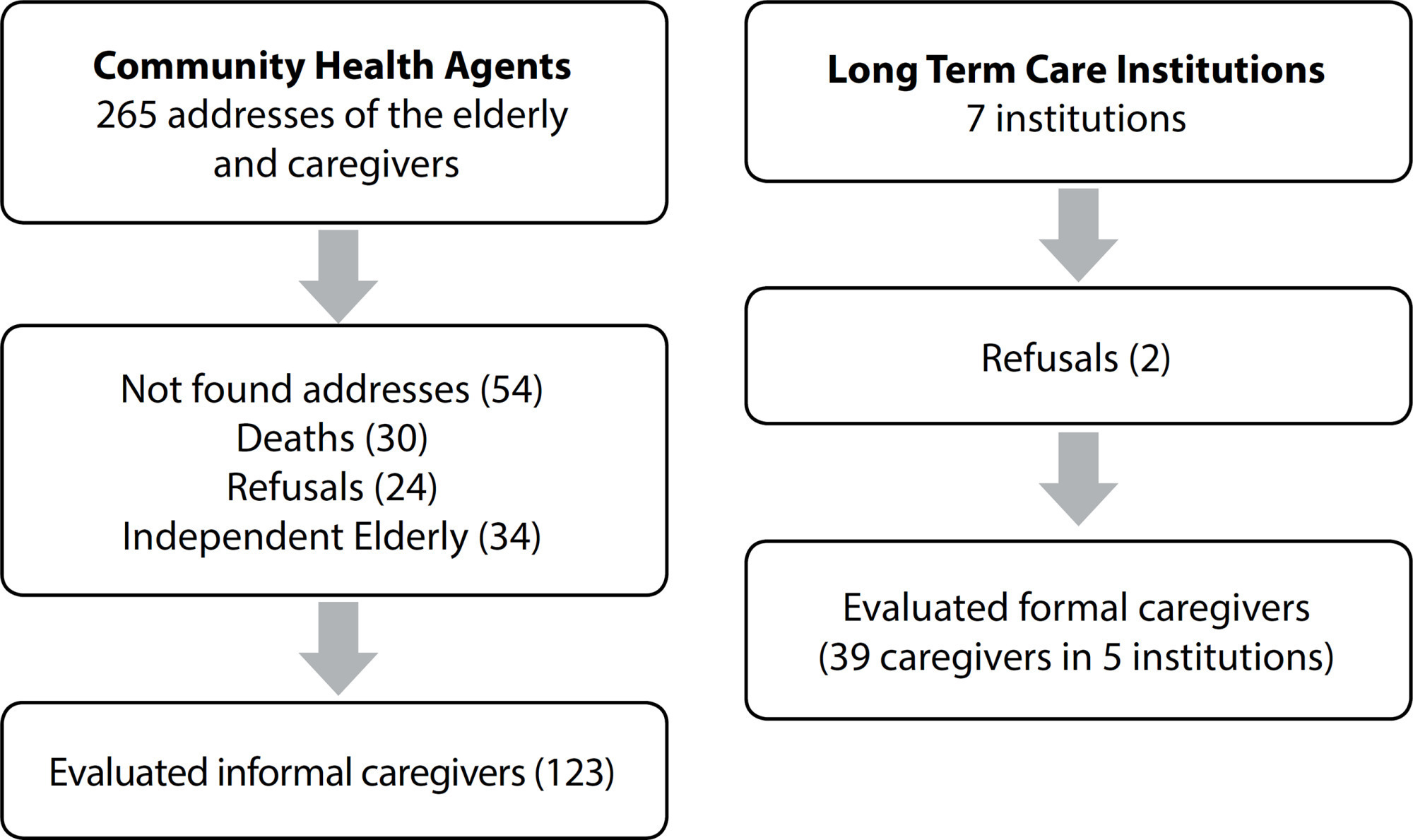
-
ORIGINAL ARTICLE09-21-2020
Contexts of vulnerabilities experienced by adolescents: challenges to public policies
Revista Brasileira de Enfermagem. 2020;73:e20190224
Abstract
ORIGINAL ARTICLEContexts of vulnerabilities experienced by adolescents: challenges to public policies
Revista Brasileira de Enfermagem. 2020;73:e20190224
DOI 10.1590/0034-7167-2019-0224
Views0See moreABSTRACT
Objectives:
to understand the context of vulnerability experienced by adolescents from the perspective of health professionals from the Family Health Strategy.
Methods:
a descriptive-exploratory qualitative study developed with 80 Family Health Strategy professionals in the Midwest region of Brazil. Data collection was developed from July to September 2018 through a focus group, and submitted to Thematic Analysis.
Results:
it was understood that the vulnerability experienced by adolescents is not an exposure to something isolated, but is linked to risk and protection factors, socioeconomic and cultural contexts, public and health policies.
Final Considerations:
there are still gaps in public policies for this population, which impacts on the access and development of promotion actions by health professionals.
-
ORIGINAL ARTICLE04-03-2020
Analysis of the guiding rules of the nurse technician’s practice in Brazil
Revista Brasileira de Enfermagem. 2020;73(3):e20180322
Abstract
ORIGINAL ARTICLEAnalysis of the guiding rules of the nurse technician’s practice in Brazil
Revista Brasileira de Enfermagem. 2020;73(3):e20180322
DOI 10.1590/0034-7167-2018-0322
Views0INTRODUCTIONThe institutionalization of nursing as a profession is characterized by the division of labor, marked by discipline and hierarchy, with the participation of several active agents, among which we can cite the nurse, the nurse technician, the nursing assistant, and the nursing attendant. The latter, although mentioned in the legislation, has been extinct since the […]See more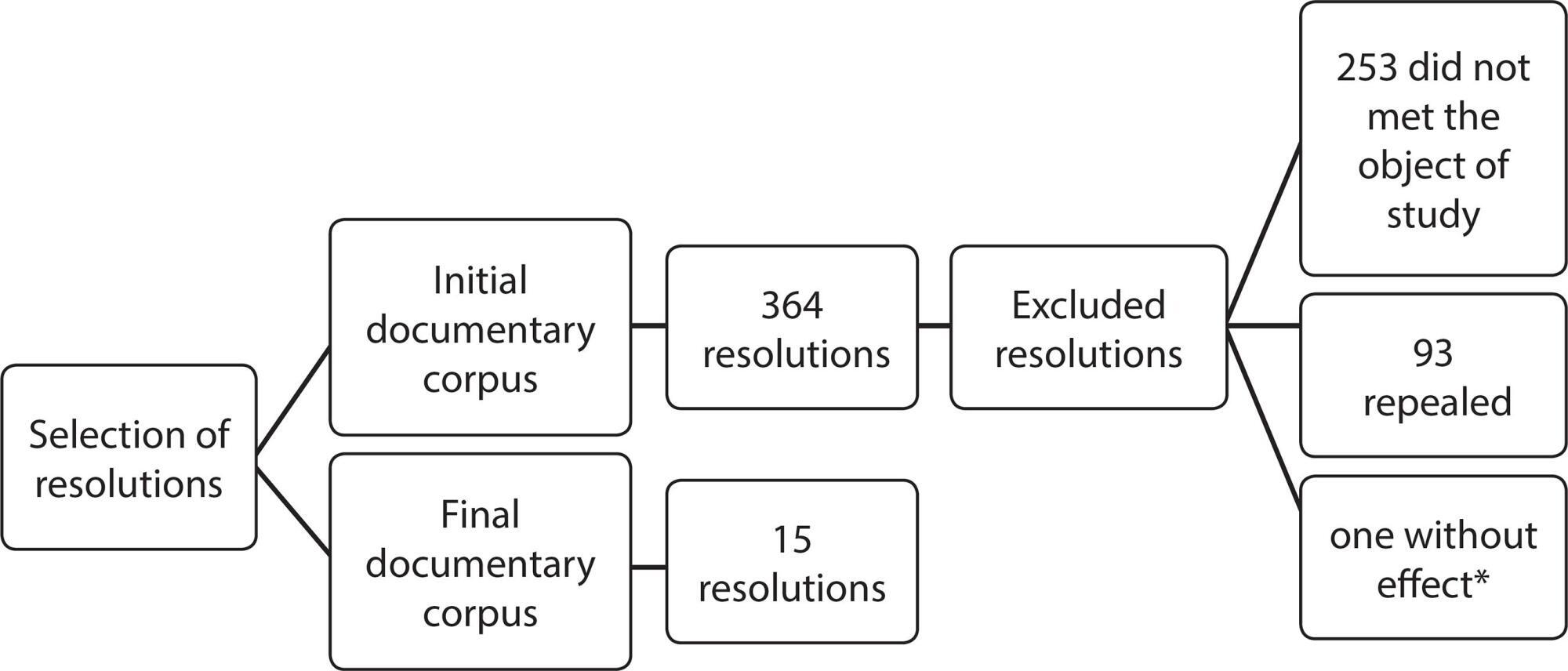
Search
Search in:
Nuvem de Tags
Aged (144) Atenção Primária à Saúde (239) COVID-19 (104) Cuidados de Enfermagem (269) Educação em Enfermagem (151) Educação em Saúde (139) Enfermagem (930) Estudos de Validação (131) Health Education (144) Idoso (208) Mental Health (149) Nursing (987) Nursing Care (306) Patient Safety (151) Primary Health Care (284) Qualidade de Vida (104) Quality of Life (106) Saúde Mental (145) Segurança do Paciente (150) Validation Studies (108)




